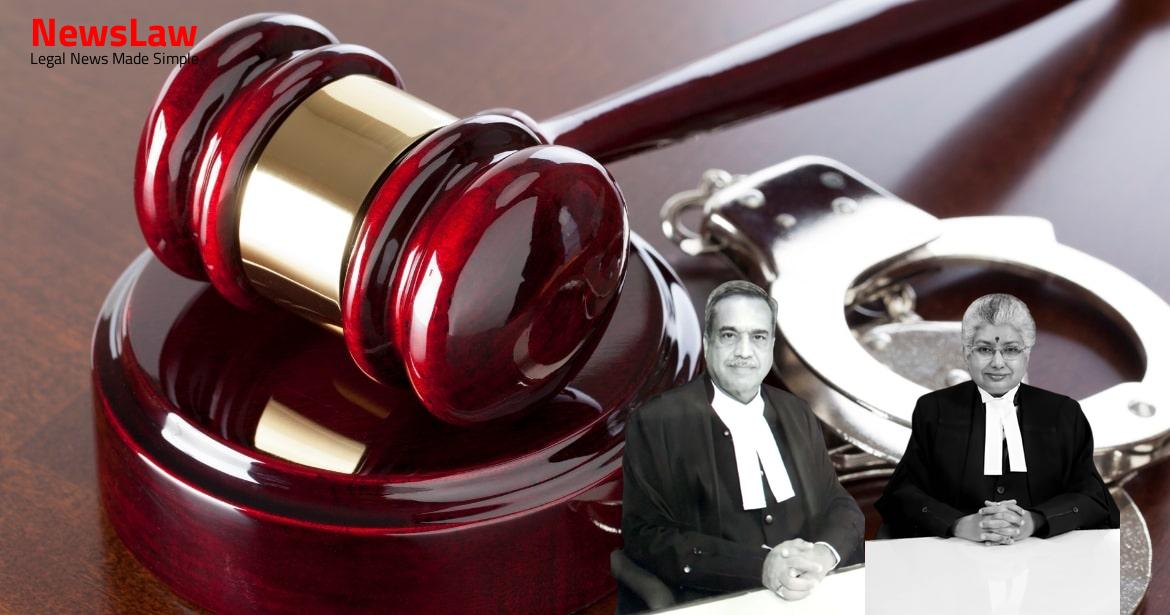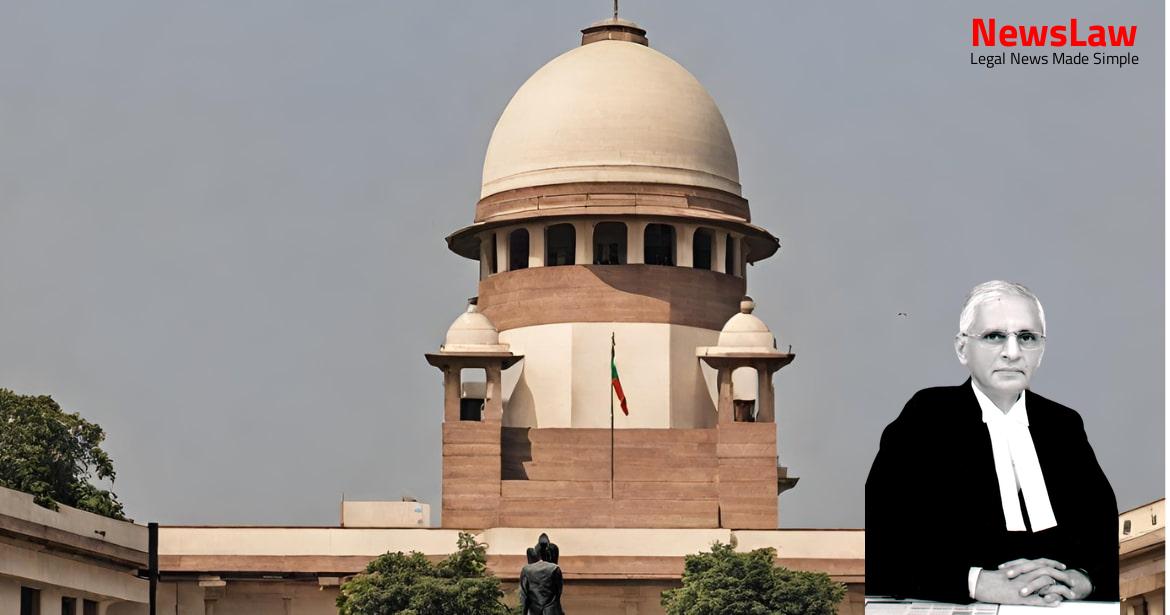The court’s legal analysis focused on the fundamental principles of neutrality and impartiality in arbitration proceedings. The case emphasizes the significance of ensuring a fair and unbiased process, highlighting the need for adherence to stringent requirements for arbitrator neutrality. Dive into the details of this critical aspect of legal proceedings and the implications it holds for the integrity of arbitration outcomes.
Facts
- The appellant filed a civil suit in 1994 seeking a permanent injunction against the respondent from awarding the supply order to a third party.
- The appellant challenged the jurisdiction by filing an application under Section 13 of the Arbitration Act, 1996.
- The High Court referred the parties to arbitration by the Stationery Purchase Committee comprising officers of the respondent.
- The appellant filed an objection to the constitution of the Arbitral Tribunal/Stationery Purchase Committee on 12.09.2000.
- The High Court dismissed the application filed by the appellant under Section 14 read with Sections 11 & 15 of the Arbitration Act, 1996.
- The High Court noted that the appellant can participate in proceedings before the Arbitral Tribunal constituted by the respondent as Stationery Purchase Committee.
Also Read: Ruling on Circumstantial Evidence in Murder Case
Arguments
- Appellant did not permit the earlier Arbitral Tribunal to proceed further with the arbitration proceedings by initiating proceedings one after another.
- Arbitrator was appointed approximately 20 years prior to the case and proceedings commenced, with appellant participating.
- Amended Section 12(5) of the Arbitration Act brought in by 2015 amendment is contended to be not applicable retrospectively.
- Previous incumbents of the Arbitral Tribunal retired without constituting a fresh Tribunal.
- Opposing counsel argues that Section 12(5) with Seventh Schedule, post 2015 amendment, does not apply retrospectively.
- Appellant argues that recent SC decision supports the appointment of a fresh Arbitral Tribunal due to loss of mandate of the old Tribunal.
- Continuation of the old Tribunal would frustrate the neutrality objective of the 2015 amendment.
- Impartial arbitrator needed to be appointed per Section 11 of the Arbitration Act, as the old Tribunal members had ceased to hold office.
- The appeal challenges the High Court’s decision, contending that the arbitration proceedings with the old Tribunal did not actually commence due to a stay.
- Section 12(5) of the Arbitration Act needs to be applied prospectively.
- It is argued that retrospective application would lead to uncertainty and disrupt established arbitration proceedings.
- The Respondent contends that prospective application would be more in line with principles of fairness and justice.
- Consideration needs to be given to the potential impact on ongoing arbitration cases if Section 12(5) is applied retrospectively.
Also Read: Challenging Legal Presumptions in Negotiable Instrument Cases
Analysis
- The need for independence and impartiality in the arbitral process is crucial regardless of the parties’ apparent agreement.
- The balance between procedural fairness and the binding nature of contracts seems skewed towards the latter by the Supreme Court, which is deemed unsatisfactory.
- An ‘express agreement’ in writing is required to meet the requirements of Section 12(5) proviso as per the case of Bharat Broadband Network Limited.
- The key test for neutrality is outlined in Section 12(3) of the Act, revolving around the existence of circumstances raising justifiable doubts regarding the arbitrator’s independence or impartiality.
- Independence and impartiality of the arbitrator are foundational elements in arbitration proceedings, essential for upholding the rule against bias as a fundamental principle of natural justice.
- While exceptions were made by the Supreme Court in appointing independent arbitrators under certain circumstances, the stringent requirements for neutrality and fairness remain paramount.
- The suggestion to allow State parties to appoint employee arbitrators is raised, with potential implications on fairness and neutrality in arbitration involving government entities.
- The Amendment Act, 2015 aimed to ensure the neutrality of arbitrators by amending Section 12 of the Arbitration Act, 1996.
- Section 12(5) of the Act along with the Seventh Schedule specifies the ineligibility criteria for arbitrators.
- Any person falling within the categories specified in the Seventh Schedule is ineligible to be appointed as an arbitrator.
- Parties may waive the applicability of Section 12(5) by an express agreement in writing after disputes have arisen between them.
- The appointment of an arbitrator must comply with the requirement of impartiality and independence, even if agreed prior to the disputes.
- The proviso to Section 12(5) allows parties to waive the ineligibility criteria if mutually agreed after a dispute.
- The neutrality of arbitrators is crucial for the arbitration process and must be upheld.
- The Commission suggested disclosure requirements for potential arbitrators to ensure impartiality.
- The objective is to avoid any circumstances that may raise justifiable doubts about an arbitrator’s neutrality.
- Section 12(5) of the Arbitration and Conciliation Act lays down that regardless of any prior agreement, a person falling under the categories listed in the Seventh Schedule is ineligible to be appointed as an arbitrator.
- Any prior agreement stating otherwise is overridden by the non-obstante clause in Section 12(5) once a person falling under the Seventh Schedule is involved.
- The sub-section clarifies that such a person is deemed ineligible to serve as an arbitrator.
- The arbitrator has lost its mandate by operation of law
- Fresh arbitrator needs to be appointed under the provisions of the Arbitration Act, 1996
- The impugned judgment and order passed by the High Court is unsustainable and should be quashed
Also Read: Legal Analysis Critique in High Court’s Quashing Order
Decision
- The appeal is allowed, and it is declared that the earlier Arbitral Tribunal is ineligible to act as arbitrators.
- The impugned judgment by the High Court of Madhya Pradesh is quashed and set aside.
- Justice Abhay Manohar Sapre is appointed as the arbitrator to resolve the dispute between the parties.
- No order as to costs is given in the circumstances of the case.
- Both parties are required to appear before the arbitrator within four weeks.
- The arbitrator is urged to conclude the arbitration proceedings and declare the award promptly considering the long-pending dispute since 2000.
Case Title: ELLORA PAPER MILLS LIMITED Vs. THE STATE OF MADHYA PRADESH (2022 INSC 11)
Case Number: C.A. No.-007697-007697 / 2021



